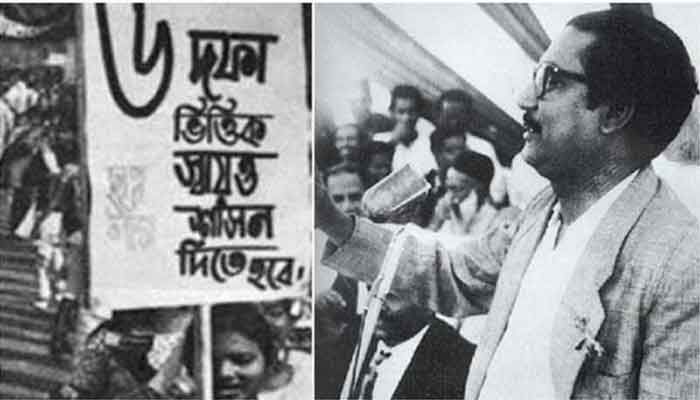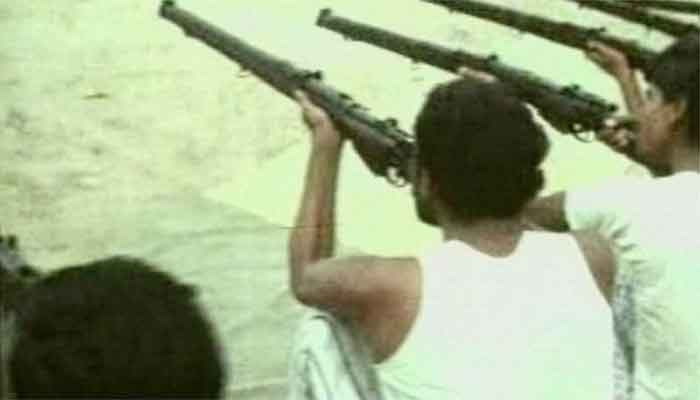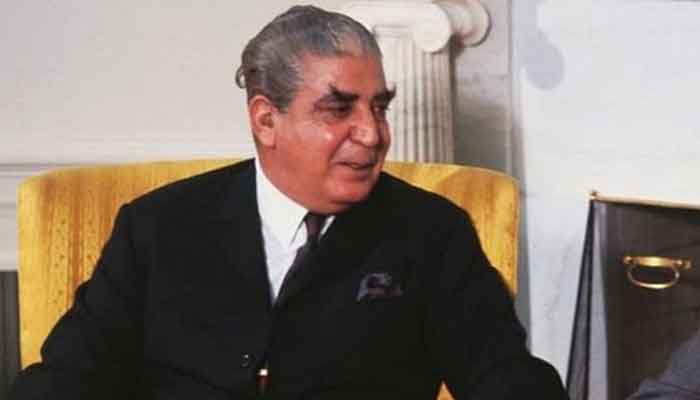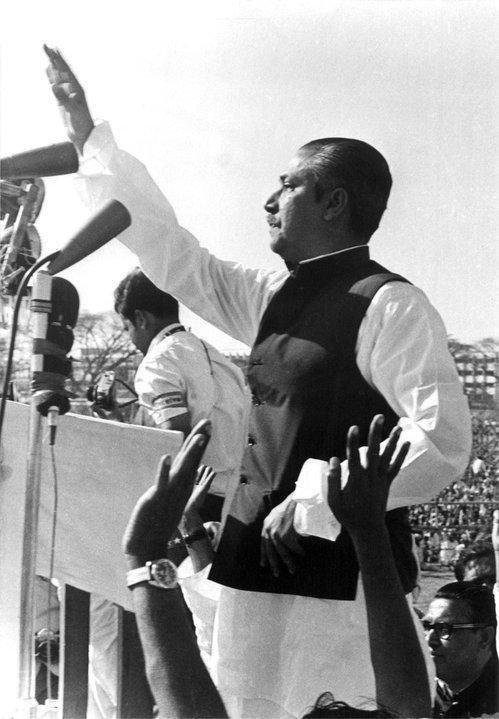
*Akbar Hossain
Publish: 07 Dec 2020, 02:49 pm

December 7, 1970. On this day, the first and last general elections of the then undivided Pakistan were held.
The Awami League under the leadership of Sheikh Mujibur Rahman won an absolute majority in that election.
Pakistan's ruling party has been reluctant to hand over power to the victorious Sheikh Mujib since the election.
The intense political crisis that started due to this ended in the war of independence of Bangladesh. Which ended with the rise of independent Bangladesh.
The context of the election
Ayub Khan was forced to relinquish power in March 1669 in the wake of the mass movement in East Pakistan.
Then the army chief General Yahya Khan took charge and imposed martial law.
Yahya Khan then announced the date for the elections to the National Assembly of Pakistan.
According to GW Chowdhury, the then communications minister of Pakistan and one of President Yahya Khan's advisers, there was no shortage of interest in holding a free election. Mr. Chowdhury noted that the president wanted the transfer of power to be smooth.
Shyamoli Ghosh of Jawaharlal Nehru University in India has done research on Awami League. He holds a PAED degree from East Pakistan Awami League.
His book 'The Awami League 1949-1971' was published in 1990.
Miss Ghosh writes that on June 7, 1970, the Awami League officially started its election campaign.

After the 1970 elections, the rulers of Pakistan did not want to hand over power to the victorious Awami League. As a result, the war of liberation started.
The election campaign speeches highlighted local issues as well as the six-point program.
Quoting Sheikh Mujibur Rahman, Miss Ghosh wrote, "If we fail to respond to the call of time, the next generation will hold us responsible."
The six-point program was the mainstay of the Awami League's election campaign. Since 1966, the Awami League has made the six-point program its main political program.
Many expressed interest in getting nomination from Awami League in the National Assembly elections.
Tajuddin Ahmed, general secretary of the East Pakistan Awami League, said at the time that 359 applications had been received for 162 seats in the National Assembly.
Researchers say Awami League leader Sheikh Mujibur Rahman realized that elections were the only way to establish himself as the sole leader of East Pakistan.
Before the election, President Yahya Khan told reporters in Dhaka that he did not consider anyone a representative of the people until he was elected by the people.
Sheikh Mujibur Rahman went to London in October 1969. In an interview with BBC Bangla, he said he could not think of himself as a representative of the people until he won the election.
'Why Sonar Bangla Slogan?'
Before the election, Sheikh Mujibur Rahman promised to build 'Sonar Bangla' in his campaign.
Observers say that the slogan 'Sonar Bangla' has received a huge response from 75 million people in East Pakistan. The basis of this 'Sonar Bangla' slogan was six-point and Bengali nationalism.
According to researcher Shyamoli Ghosh, a poster left a mark on the minds of the people of East Pakistan during the election campaign. The slogan is, "Why Sonar Bangla Slogan?"
The poster highlights how the people of East Pakistan are being deprived due to economic inequality by West Pakistanis.
The election campaign and the fear of the Pakistani rulers
Throughout the seventies, there was electoral fervor and activity. Although the pro-China communists decided to boycott the election.
Haider Akbar Khan Rono, a left-wing politician, wrote in his memoir 'Century Beyond' that the right-wing parties could not stand the tide of Sheikh Mujib, the Awami League and the Six Poles in East Pakistan at that time.
Mr. "Right-wing parties tried to portray Sheikh Mujib as a puppet of the Hindus in India, but to no avail. Opposition to West Pakistan, not India, was strong in the minds of the people at the time," Rono said.

Not only the election, but also about four years ago, Sheikh Mujibur Rahman started forming public opinion with the six-point demand. The six-point issue became prominent during the election campaign.
During the campaign, Sheikh Mujibur Rahman said several times that this election will be a referendum or referendum in favor of the six-point plan.
In an interview with BBC Bangla in March 2020, Rehman Sobhan said about the 1970 elections that it was a kind of referendum.
During that election, Sheikh Mujibur Rahman became a 'symbolic figure' through six points.
However, the rulers of Pakistan considered these six points as 'pseudo-documents of separatism'.
During the election campaign, President Yahya Khan's advisor and minister G. W Chowdhury advised the President to speak directly to Sheikh Mujib on the issue. He advised the President to find out whether Sheikh Mujib could amend the six-point demand. Chowdhury.
"If Mujib does not want to accept the issue, then I suggested holding a referendum. The subject of the referendum would be - do Bengali Muslims want an undivided Pakistan or want to be separate?"
But Yahya Khan did not hear that. Chowdhury.
The parties participating in the election
Apart from Sheikh Mujib, Maulana Abdul Hamid Khan Bhasani was an influential leader in East Pakistan at that time. Although Bhasani initially agreed to run in the 1970 elections, he withdrew in late November, calling for a boycott.
His decision is still debated in the political arena. Many think that Maulana Bhasani made a mistake by not participating in the 1970 elections.
But his followers say different things.
They say that if Bhasani had stayed in the polls till the end, the vote would have been divided in East Pakistan and the Awami League might not have gained absolute dominance.
Haider Akbar Khan Rono, a follower of Maulana Bhasani, wrote, "I think Bhasani wanted to give a walkover to Sheikh Mujib so that Sheikh Mujibur would come out alone. He thought it would make the question of independence easier."
A total of 24 parties participated in the election. The Awami League got the boat brand in the election. On the other hand, the Pakistan People's Party led by Zulfiqar Ali Bhutto, the ultimate rival of the Awami League, was the symbol of the sword. The other parties that took part in the election were not so strong.
No ruling political party participated in the 1970 elections. No cabinet member of the Yahya Khan government was allowed to contest the election. G. According to W Chowdhury, that election was truly under a 'caretaker government'.
In that National Assembly election, East Pakistan had 162 seats and West Pakistan had 137 seats.
In East Pakistan, the Awami League fielded candidates for all the seats. No other political party has fielded candidates for all the seats.
The Pakistan Muslim League (Convention) was the second highest candidate in East Pakistan. Their number of candidates was 93. Besides, Pakistan Democratic Party fielded candidates in 79 seats and Jamaat-e-Islami in 70 seats.
Researcher Shyamoli Ghosh has analyzed the Awami League nominated candidates. His observations show that about 48 per cent of those nominated by the Awami League for 162 seats in the National Assembly elections were lawyers. Besides, businessmen were 19 percent and college and university teachers were 6 percent.
The Pakistan People's Party, led by Zulfikar Ali Bhutto, did not field a candidate in East Pakistan.
G. According to W Chowdhury, Zulfikar Ali Bhutto did not 'dare' to field any candidate in East Pakistan.
On the other hand, out of 138 seats in West Pakistan, the Pakistan People's Party fielded the most candidates. But they did not field candidates in all the seats. The number of candidates of Pakistan People's Party was 119.
The Awami League fielded only eight candidates in West Pakistan.
The result of the vote
A month before the 1970 elections, a severe cyclone hit the coastal districts, including Bhola. The indifference of the Pakistani government after that storm caused great anger in the minds of the Bengalis.
Observers say everyone got an early idea of what the outcome of the election might be like after that storm.

After his release from prison through the mass movement of 1969, Sheikh Mujib became very influential
The Awami League won 160 of the 162 seats in East Pakistan.
Nurul Amin and Chakma Raja Tridib Roy won one of the remaining two seats in East Pakistan.
On the other hand, the Pakistan People's Party led by Zulfikar Ali Bhutto won 81 out of 138 seats in West Pakistan.
Siddique Salik, the then public relations officer of the Pakistan Army, wrote in his memoir 'Witness to Surrender' that the Awami League had practically won the election before the vote. The election on December 7 was just a formality.
Through that election, Sheikh Mujibur Rahman became the sole leader in East Pakistan and Zulfiqar Ali Bhutto in West Pakistan.
The results of this election indicate differences of opinion between the people of the two parts of Pakistan.
Post-election status
After the victory of Awami League in the election, the crisis started anew.
Zulfikar Ali Bhutto claims to be the leader of West Pakistan.
On the other hand, Sheikh Mujibur Rahman became the leader of East Pakistan.
At the time of the election, the whole of East Pakistan was considered as one province. West Pakistan, on the other hand, is divided into four provinces.
Mr. Bhutto raised the question, how can the rule of the whole of Pakistan be handed over to Sheikh Mujib after winning a province?
Mr. Because of Bhutto's position, President Yahya Khan began to delay the transfer of power to Sheikh Mujib.
Instead of calling on Sheikh Mujib to form a government, President Yahya Khan adjourned the National Assembly session on March 1, 1971 indefinitely.
In protest, a non-cooperation movement was started in East Pakistan under the leadership of Sheikh Mujib.
As a result, the Pakistan Army carried out genocide on the night of March 25 and the war of independence of Bangladesh began.
Source: BBC Bangla
*The writer works at BBC Bangla, Dhaka
Subscribe Shampratik Deshkal Youtube Channel
Topic : Others
© 2024 Shampratik Deshkal All Rights Reserved. Design & Developed By Root Soft Bangladesh